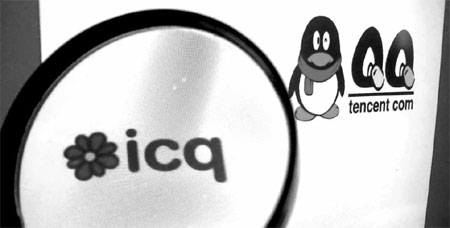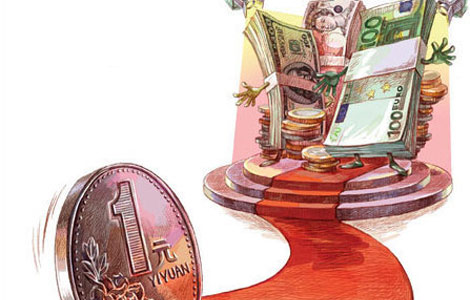Long conflict over QQ continues into court
Updated: 2013-07-24 07:21
By Zhang Zhao (China Daily)
|
||||||||
|
Chinese IT giant Tencent has been battling domestic automaker Chery over the trademark rights to QQ for a decade. Jing Wei / for China Daily |
QQ is a household name in China. Not only mega-popular online chat software developed by Tencent, it is also a best-selling car from domestic automaker Chery.
The IT giant and the carmaker have both used QQ - a derivative of "cute" - for more than 10 years. But they have never stopped arguing about the ownership of the name.
The saga continued last week as the First Intermediate People's Court of Beijing began hearing a lawsuit filed by Tencent against the Trademark Appeal Board of the State Administration for Industry and Commerce. Chery is involved as a third-party respondent.
In 2005, Tencent applied for the QQ trademark in the category of automobiles and gained approval in 2008. But Chery had already acquired the same trademark in 2003 and had actually been selling cars with that name since. So it filed an objection with the Trademark Appeal Board.
The board then revoked Tencent's rights to the QQ name on cars.
The story dates back even further to 1999, when Tencent unveiled its instant online messaging software, then called OICQ. But it soon received complaints from US Internet giant AOL, which said the name violated its rights to ICQ, software it developed three years earlier.
So the Chinese company decided to change the name to QQ in 2000, and was awarded the trademark the next year. But it was approved for use in the form of graphics and only in the category of "computer terminal communication tools".
In the ongoing court case, Tencent claims the Trademark Appeal Board's revocation was "an obvious mistake" because it was Chery that violated the trademark in the first place. But the board, as the defendant, maintains that its ruling is legal and should be upheld.
A Tencent public relations manager quoted in the Nanfang Daily said Chery has been "hitching a ride on Tencent all these years" and used the fame of the QQ name to sell cars.
But according to Chery, the QQ name was inspired by the design of the car's taillights, which look like the letter Q when lit. That design has also been patented by the company.
"For years we have advertised the Chery QQ on the Tencent website and Tencent charged us ad fees," a Chery executive told The Beijing Times, suggesting that Tencent has acknowledged and acquiesced to the coexistence of the two QQ trademarks.
Jin Yibo, a spokesman for Chery, said the two companies before had "an unvoiced pact" to promote the QQ brand together, and even held negotiations to discuss forms of cooperation.
Xu Xinming, an intellectual property lawyer and partner at Beijing Mingtai Law Firm, said losing the QQ trademark in the auto category will have little direct impact on Tencent, as it currently has no business in the sector.
"But it does have a lot of business in real time messaging, with QQ a household name, so it has reasons to worry that a QQ trademark in another business will weaken its own image.
"For Chery, whose QQ cars have been on the market for many years, losing the trademark would bring great losses," Xu added.
Another intellectual property expert, Tang Guangliang from the Chinese Academy of Social Sciences, told the Beijing Daily that the key to judging infringement is not if a trademark is similar to another, but whether the two cause consumer confusion.
"For example, if consumers buy the QQ cars because they believe the cars are produced by Tencent, or if people use the QQ software because they like the QQ cars, that is confusion," he explained. "If this does not happen, then there is no necessity for the two sides to fight," said Tang.
The initial hearing on the lawsuit lasted two hours on July 16 and there is yet no word on when a verdict might be rendered.
Although the case does not involve compensation, industry insiders said there will be continuing lawsuits between the two companies, and the side that loses is likely to face a large judgment for damages.
zhangzhao@chinadaily.com.cn
(China Daily USA 07/24/2013 page14)
Most Viewed
Editor's Picks

|

|

|

|

|

|
Today's Top News
US diplomat says China ties a priority
Nation falling short on IT security
Weiner not dropping out of NYC mayoral race
Death toll from H1N1 in Argentina reaches 38
DPRK halt on rocket facility confirmed
Celebrations erupt after word of regal delivery
Office to close due to protest in Manila
Multinationals' dependence on China grows
US Weekly

|

|















